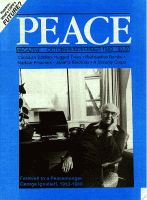
Peace Magazine Oct-Nov 1989, page 13. Some rights reserved.
Search for other articles by Cyril Powles here
Whether or not the upset victory of the Japan Socialist Party (JSP) in the recent Upper House elections means anything for peace lovers will take a while to become apparent. After nearly 35 years of virtual monopoly government, the conservative, business-backed Liberal Democratic Party (LDP) lost its majority in what corresponds to the Senate in the Japanese Parliament.
Two main factors led to this defeat. The first was increasing criticism of corruption within the party, climaxed by revelations of share-peddling scandal initiated by the Recruit employment agency. Even more crucial was an unpopular, three-percent consumption tax which had been rammed through in late 1988 by the Takeshita cabinet. Women voters hated Takeshita's successor, Sosuke Uno, for his sexual promiscuity and male chauvinism. That the leader of the JSP was a woman helped to swing many usually inactive voters behind the socialists.
The long reign of the LDP has seen a progressive militarization of the country, which has grown with the increased economic power of Japan. Because most leaders of the party grew up in the days of militarism, it was difficult for them to see power expressed in any way except the conventional one of military might. From the days of the Korean War, when the convenient euphemism of "Self-Defence" was applied to permit the building of land and naval forces in disregard of a constitution that abjured armed conflict, the budget for "defence" has grown steadily; now it compares to that of the leading military "great powers."
In contrast, the JSP has stood for a much more literal interpretation of the Peace Constitution. Where the LDP relied on a Mutual Security Pact with the United States, which integrated it into the worldwide strategic network of that country, the socialists stood for a relation with Japan's big neighbor and trading partner that would be commercial and political, rather than military. Thus it is natural to conclude that a victory for them would mean a reversal of the defence policies of the rival party, leading to a greater emphasis on peaceful security measures.
Several factors, however, make this hope seem somewhat dim. Elections to the Upper House are not the same thing as a general election to the Lower House, where the real legislative power resides. Although the Upper House has a clearer legislative role than does our Senate, the power to initiate legislation begins in the Lower House, where it can be assumed that the LDP is well-entrenched.
Moreover, a country as economically oriented as Japan is today will not risk the upheaval involved in changing to a party even as mild as the socialists. Thus it seems unlikely that that party could completely overthrow the LDP. At best, the LDP may be returned with a sharply reduced majority, or perhaps be forced to enter into some kind of coalition agreement with one or more of the smaller parties, such as the Democratic Socialists or the Komeito (Clean Government Party), both of which have also been tainted by the Recruit scandal.
Even if the JSP were to gain a majority, it is unlikely that they would be able for some time to effect much significant change in defence policy. The examples of both the NDP here in Canada and of the Labour Party in England show that the margins of possibility for significant, short-term change are strictly limited. At the same time, Takako Doi, the chairperson of JSP, appears to be one of the more dynamic leaders to appear on the Japanese political horizon. There is no doubt that she herself is a woman of principle, capable of resolute action when called for. So, even if the JSP were only to be returned with increased strength in the Lower House, she would be able to make things interesting for the government, particularly when it came to changes in the defence budget or in military relations with the United States.
A couple of postscript notes: Women in Japan, since the end of World War II, have formed the backbone of the peace movement. To have someone like Ms Doi on whom to focus their political activity could result in some surprising results electorally. Secondly, the LDP, during its long term in power, has been responsible for a series of actions which represented a steady erosion of the postwar constitution's democratic, peaceful provisions. The imperial institution, with its militaristic associations, has been brought back to a more central position, while the Emperor and high government officials have increasingly been worshiping at the old State Shinto shrines (again with warlike associations) in their official capacity as representatives of the nation. Increased strength of the JSP would be sure to limit this militaristic drift.
Cyril Powles, a theologian at Trinity College, lived in Japan for many years.

Peace Magazine Oct-Nov 1989, page 13. Some rights reserved.
Search for other articles by Cyril Powles here